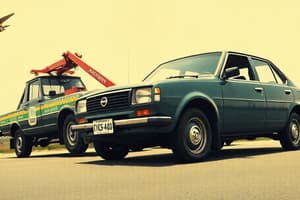Podcast
Questions and Answers
What is the recommended tire pressure for off-road driving in mud and sand?
What is the recommended tire pressure for off-road driving in mud and sand?
- 3.40 bar for front axle, 7.10 bar for rear axle
- 3.40 bar for both front and rear axle
- 2.00 bar for both front and rear axle
- 2.00 bar for front axle, 3.70 bar for rear axle (correct)
What is the torque setting for the wheel nuts?
What is the torque setting for the wheel nuts?
- 260 Nm
- 7.7 Nm
- 575 Nm (correct)
- 120 Nm
What is the fuel tank capacity of the vehicle?
What is the fuel tank capacity of the vehicle?
- 120 litres
- 500 km
- 400 litres (correct)
- 260 litres
What is the recommended oil for the central hydraulic system?
What is the recommended oil for the central hydraulic system?
What is the recommended oil for the top hamper hydraulic system?
What is the recommended oil for the top hamper hydraulic system?
What is the recommended procedure for checking the transmission oil level when the engine is cold?
What is the recommended procedure for checking the transmission oil level when the engine is cold?
What is the recommended procedure for checking the transmission oil level when the engine is hot?
What is the recommended procedure for checking the transmission oil level when the engine is hot?
What is the operating voltage of the electrical system?
What is the operating voltage of the electrical system?
What is the purpose of the auxiliary battery box?
What is the purpose of the auxiliary battery box?
What is the recommended air pressure for the tyre inflator?
What is the recommended air pressure for the tyre inflator?
What is the maximum gross vehicle weight (GVW) of the recovery vehicle?
What is the maximum gross vehicle weight (GVW) of the recovery vehicle?
What is the recommended tire pressure for the front axle tires during normal road driving?
What is the recommended tire pressure for the front axle tires during normal road driving?
What is the fording depth (unprepared) of the recovery vehicle?
What is the fording depth (unprepared) of the recovery vehicle?
What is the drive configuration of the recovery vehicle?
What is the drive configuration of the recovery vehicle?
What is the oil quantity range between the minimum and maximum levels?
What is the oil quantity range between the minimum and maximum levels?
What is the overall width of the recovery vehicle?
What is the overall width of the recovery vehicle?
What is the maximum speed of the recovery vehicle?
What is the maximum speed of the recovery vehicle?
What is the turning circle (wall to wall) of the recovery vehicle?
What is the turning circle (wall to wall) of the recovery vehicle?
What is the ground clearance at the rear of the vehicle?
What is the ground clearance at the rear of the vehicle?
What is the gross train weight (GTW) of the recovery vehicle?
What is the gross train weight (GTW) of the recovery vehicle?
Flashcards are hidden until you start studying
Study Notes
Wheels & Tyres
- Front axle tyres: 16.00 R 20 XZL tyres & 10.00W – 20” rims
- Rear axle tyres: 16.00 R 20 XZL tyres & 10.00W – 20” rims
- Tyre pressure for off-road driving:
- X-country: 3.40 bar (front), 7.10 bar (rear)
- Mud & sand: 2.00 bar (front), 3.70 bar (rear)
- Tyre pressure for normal road driving:
- Front axle: 5 bar
- Rear axle: 7.60 bar
- Wheel nut torque settings: 575 Nm (after fitting, re-check after 50 km)
Fuel System
- Fuel tank capacity: 400 litres
- Range: 500 km
- Pre-filter type: Pre-cleaner with cartridge
- Main filter type: Micro filter
- Injection system: Common rail, EDC
Hydraulic System
- Central Hydraulic System: 120ltrs OX75 – BUM (OM15 below -15)
- Top Hamper Hydraulic System (Main Hydraulic Tank): 260ltrs OX75 – BUM (OM15 below -15)
- Checking oil level with cold transmission and engine running:
- Run engine at 1200 to 1500rpm for 15 to 20 seconds and then at an idle speed of 600 to 800 rpm for 2 to 3 minutes
- Remove dipstick and check oil level within cold zone 30°c markings
- Checking oil level with hot transmission and engine running:
- Run engine to achieve normal coolant temperature and then run at 1800rpm for a further 10 minutes
- Allow engine to idle at 600 to 800rpm for 2 minutes and remove dipstick
- Check oil level within warm zone 80 to 90°c markings
Electrical System
- Rated voltage: 24V
- Operating voltage: 28V
- Batteries: 12V/100Ah NATO EMC/NEMP protection, 4 automotive & 2 radio
- 6 monthly check, clean and grease terminals
- Auxiliary Battery Box: Emergency-off switch located on the left-hand side of the vehicle
- If radio power is required when the vehicle is shut down, the auxiliary battery emergency switch must be set to on
Recovery Vehicle (RV) Operating Information and Vehicle Data
- Overall length (including trailer coupling): 10465 mm
- Height to top of cab: 3034 mm
- Height to highest fixed point: 3300 mm
- Guard over crane controls: Overall Width 2550 mm
- Ground Clearance: Front 430 mm, Rear 390 mm
- Fording Depth: 1200 mm (unprepared), 1500 mm (prepared)
- Drive Configuration: 8 x 8
- Front Axle Plated Weight: 8100 kg each axle
- Rear Axle Plated Weight: 9000 kg each axle
- Gross Vehicle Weight (GVW): 30000 kg
- Gross Train Weight (GTW): 72000 kg
- Approach Angle: 40°
- Departing Angle: 35°
- Turning Circle (wall to wall): 28.6 m
- Maximum Speed: 88 kph (56 mph)
Other
- Oil capacity: 42 Litres OX 90 – BUM & EUM
- Oil quantity between MIN and MAX: 6 litres
- Braking System: 6 bar
- Tyre Inflator: 8.5 bar
- Air Tools: 10 bar
Studying That Suits You
Use AI to generate personalized quizzes and flashcards to suit your learning preferences.




